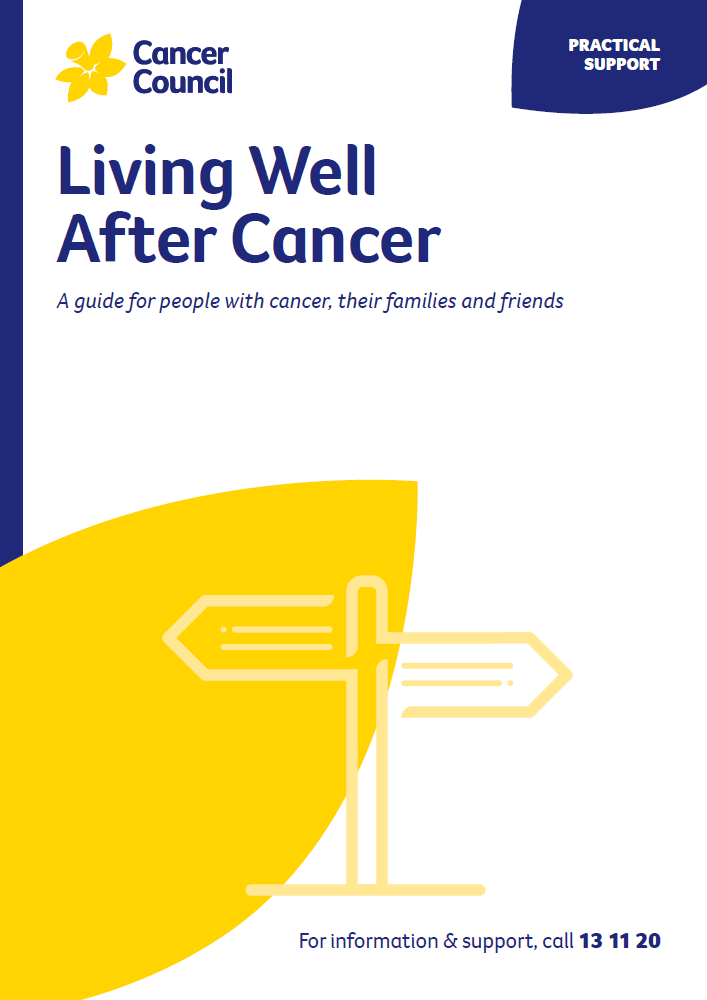- Home
- About Cancer
- Living well
- Living well after cancer
- Follow-up care
- Follow-up appointments
Follow-up appointments
Here are some helpful questions and answers about follow-up appointments after you finish cancer treatment:
- How often do I need check-ups?
- What happens at follow-up appointments?
- Who do I see for follow-up care?
How often do I need check-ups?
This is different for everyone. Your follow-up schedule depends on the type of cancer and treatment, the side effects experienced, and any other health conditions you are managing.
Some people have check-ups every 3–6 months for the first few years after treatment, then less often after that. Talk to your doctors about what to expect and ask if Australian guidelines or optimal care pathways exist for your follow-up care. Find out about what to expect at every stage of cancer care, including after treatment.
If you are worried or notice any new symptoms between appointments, contact your GP right away. Don’t wait until your next scheduled appointment with the specialist.
What happens at follow-up appointments?
During check-ups your doctor or nurse may:
- assess your recovery
- ask how you’re feeling and coping with life after cancer
- do a physical examination
- monitor and treat any ongoing side effects and talk to you about any late side effects of treatment to watch out for
- look for any signs that the cancer may be coming back
- check any new symptoms
- ask if you have any concerns or questions
- discuss your general health and give healthy lifestyle advice
- outline how the cancer and its treatment might interact with any other health problems
- refer you to other health professionals and services, as necessary.
If you are on maintenance treatment (such as hormone therapy for breast or prostate cancer), talk to your treatment team about how long the therapy will continue and side effects to look out for.
Some people may need blood tests and scans, for example, mammograms for women treated for breast cancer, or prostate specific antigen (PSA) tests for men treated for prostate cancer. If you live a long way from your treatment centre, ask if you can have the tests in your local area.
Not everyone will need or benefit from ongoing tests and scans. For many cancer types, having blood tests for tumour markers and imaging scans has not been shown to help identify a return of cancer.
It is important to tell your doctors about any new or ongoing symptoms so that they can help you manage them. For example, tell them if you feel low in mood or energy, aren’t sleeping, have a reaction to any medicines, or have pain or fatigue.
Managing your own health is an important part of survivorship. With the support of your health care team, there are many steps you can take to look after your own wellness, including monitoring your body for any signs that the cancer has returned, managing any side effects and making healthy lifestyle choices.
→ READ MORE: Who do I see for follow-up care?
More resources
Prof Michael Jefford, Medical Oncologist and Director, Australian Cancer Survivorship Centre, Peter MacCallum Cancer Centre, VIC (clinical review); Lucy Bailey, Nurse Counsellor, Cancer Council Queensland; Philip Bullas, Consumer; Dr Kate Gunn, Clinical Psychologist and Senior Research Fellow, Department of Rural Health, University of South Australia, SA; Rosemerry Hodgkin, 13 11 20 Consultant, Cancer Council WA; Prof David Joske, Clinical Haematologist, Sir Charles Gairdner Hospital and Clinical Professor of Medicine, The University of Western Australia, WA; Kim Kerin-Ayres, Clinical Nurse Consultant, Cancer Survivorship, Concord Hospital, NSW; Sally Littlewood, Physiotherapist, Seymour Health, VIC; Georgina Lohse, Social Worker, GV Health, VIC; Melanie Moore, Exercise Physiologist and Clinical Supervisor, University of Canberra Cancer Wellness Clinic, ACT; June Savva, Senior Clinician Dietitian, Nutrition and Dietetics, Monash Cancer Centre, Monash Health, VIC; Dr Elysia Thornton-Benko, Specialist General Practitioner and Research Fellow, University of New South Wales, NSW; Prof Janette Vardy, Medical Oncologist, Concord Cancer Centre and Professor of Cancer Medicine, The University of Sydney, NSW; Lyndell Wills, Consumer.
View the Cancer Council NSW editorial policy.
View all publications or call 13 11 20 for free printed copies.

